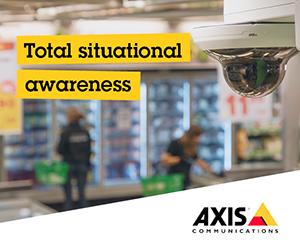LAW ENFORCEMENT
New priorities needed to better deliver on 'data disconnects'
The chairman of the National Business Crime Solution (NBCS), the UK’s largest not-for-profit intelligence sharing organisation targeting prolific and persistent store thieves has called upon the wider retail and law enforcement communities to reset priorities to better identify and prosecute prolific offenders.
Tim Edwards said the NBCS was committed to exploring and eliminating ‘data disconnects’ and discrepancies around accurate arrest and detention figures and also called for the more widespread adoption of enhanced CCTV images to improve the reliability of evidence required for the successful roll-out of facial recognition technology.
Policing is now forensically looking for better outcomes on retail crime prevention, detection and prosecution, but there are data disconnects in terms of images and information from DEMs (data evidence management) systems to measuring the progress of the Police Action Plan designed by Policing Minister Chris Philp and the NPCC.
Chief Superintendent Alex Goss, the NPCC’s lead on retail crime, has been tasked with auditing outcomes, but according to Tim, who was speaking at the NBCS’s annual conference at Old Trafford in Manchester: “Delivery led by Alex Goss has recently been asking for information to measure its success - wanting details of offender detentions and police responses. Disappointingly, not many of us were able to provide the information."
However, Tim said partnering with ShopSafe through NBCS’s Connect Direct model targeting prolific offenders to deliver intelligence through its augmented analytics platform is likely to deliver on the localised crime promise.
Nationally, all crime data from member businesses will continue to be pooled within iNTEL ONE, NBCS’s bespoke incident management system.
“The ShopSafe online portal which will enable member businesses to submit a suspect image themselves into Faicetech, our facial matching software to identify their local offenders, is currently being developed and will, in my view, be a major step forward.
“The NBCC is having ongoing discussions to amend its current information sharing agreement (ISA) which will allow us to use Police custody images for the face matching purposes, and that will help to overcome any false positives.
“So, at the point of a retailer submitting an image, the software will analyse it and either accept it or reject it on the basis of the quality of the image.”
But he called for retailers to improve their own CCTV images to facilitate this step change.
“This, in my opinion, will be a useful test for all of us. As retail businesses, we do need to improve our CCTV image quality and to be fair, the technology is out there to enable us to do it. We now have a database containing almost 1,000 images of the worst offenders.
“Using this portal will not only ensure the crime is documented and logged in our system and the image added to our database, but it also means it will have the effect of triaging incidents meaning that we will only request a Police search through the PND if the offender is not already known to us.
“Completing this online facial matching on the portal will now provide that information and the necessary measure for policing."
Having such information will also provide a clearer picture of police action and response times, said Tim.
“Alex Goss has recently reported that police attend 75 per cent of all detained retail offenders and 60 per cent of incidents where violence occurs. We, as retailers disagree with that figure, but we need all our data in one place to accurately dispute it.
“There is work going on between the British Retail Consortium, NBCS, Safer London and Retailers Against Crime to try to agree a way forward to enable this. But we need a retail data lake to build an incontrovertible picture.
"Time is short as Government priorities change to manage other law enforcement crises," added Tim.
“Our problems are not going away. The prisons being too full and so the Government is proposing to create a new legal presumption that offenders facing jail terms of under twelve-months will have their sentences suspended and will serve them in the community doing unpaid work such as litter picking.
“The Ministry of justice found that 54 per cent of jailed offenders reoffended versus 46 per cent for those handed suspended prison terms.
"Only 15 per cent of reported shoplifting cases last year resulted in an offender being charged or summonsed for the offence. An additional 20,000 police officers have been recruited, which has probably put us back where we should have been 10 years ago, but in fact figures show there are now less officers overall since that recruitment target was met. We have 311 fewer police officers, 343 fewer NCA officers and 611 fewer PCSOs.
“Indeed, one council I know about has defunded the four PCSO’s it originally funded to recruit its own officers to deal with ‘environmental’ crime. Fines are now being issued for leaving your car engine idling to keep warm in council owned car parks - have we got our priorities right? Does it need a reset?
“This reminds me of an incident when the policing minister was championing citizens’ arrests. A retired police officer, who I actually know, observed an offender steal from a supermarket. He pursued the offender in his car and, in doing so, went the wrong way up a one-way street. He managed to detain the offender, but he was then released without charge whereas the former police officer was later given a fixed penalty for the driving offence.
“The Chancellor’s scaling back of public spending could further impact border force and policing costs against the backdrop of the BRC’s recent survey which estimates customer theft at a cost of £1.8bn per annum, double the previous year and 16 million incidents, again, double the previous year.
“However, at the same time there were a record number of fines for 20mph offences last year, over 216,000 fines were issued for driving over 20mph but under 30mph - four times more than in 2018. I ask again, are we getting our priorities right or is it all about money?
“Retailers have just stumped up £600,000 over 2 years to pay for additional policing resources to target organised retail offenders, this against a backdrop of parliament employing traffic marshalls operating within the parliamentary estate which are on target to cost just under £2m over a twelve-month period. This is incredible!
The NBCS conference and gala dinner for the NBCS Foundation which raised £49,000 for support initiatives for retail crime offenders with drug or alcohol dependencies, also announced improvements to NBCS’s local Connect Direct service targeting prolific local offenders and progress on FaiceTech, the NBCS’s own bespoke facial matching programme.






